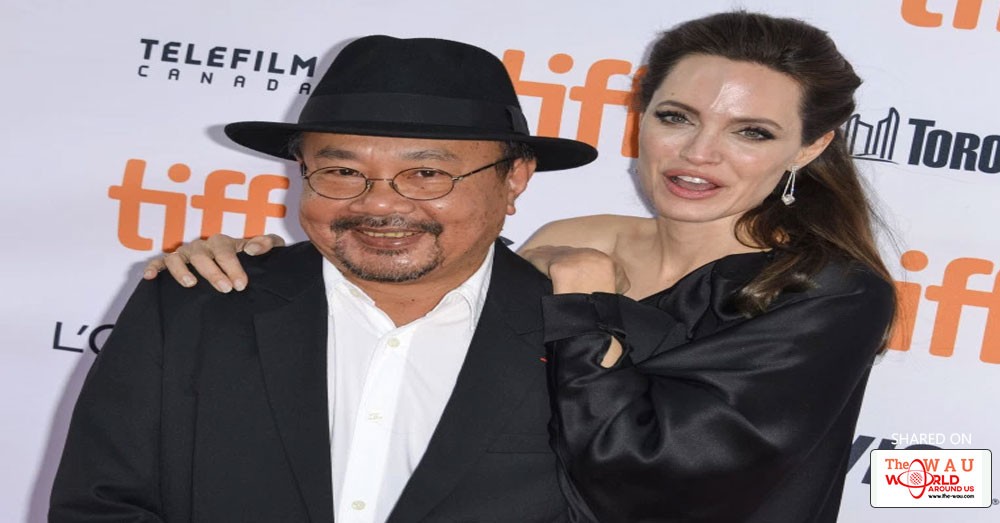Angelina Jolie may be a global celebrity, but she’s also a Cambodian citizen, and that balance was essential when she directed “First They Killed My Father,” Netflix’s drama about the experiences of a young girl whose family was torn apart by the Khmer Rouge. While Jolie’s citizenship helped the movie become Cambodia’s Oscar submission this fall, the film was aided by another key figure whose work thrives far from Hollywood — producer Rithy Panh.
Cinephiles have celebrated Panh’s work for decades. The filmmaker, who lost much of his family in the Khmer Rouge genocide, has chronicled modern Cambodian life with a range projects that blur the line between fiction and documentary. His 2013 film “The Missing Picture” combined personal recollections of his family with stop-motion animation to create a thoroughly modern meditation on the reverberations of the past in the present. “She didn’t come to make the film about us,” he said in a phone interview, “but to make a film with us.”
In early financing stages, Panh said there was some discussion about making the film in English in the hopes of securing more funding. Jolie was opposed to it — and that, Panh said, convinced him of her credentials to tell this story. “Angelina would not have done the film in English,” he said. “We live in this global time where, if you want to make a big film, you have to put a Chinese or American actor in it. She made the film in our language, with our people.”
Unfortunately, that decision led to a whole new challenge when Jolie discussed a widely criticized child casting process in Vanity Fair, in which casting directors placed money on a table and coached the actors to snatch it away. Speaking of Srey Moch, who eventually nabbed the lead role, Jolie said, “When she was forced to give [the money] back, she became overwhelmed with emotion.” Later, Jolie criticized the magazine for mischaracterizing what she called “a pretend exercise in improvisation.” (Vanity Fair stood by its story.) Asked about the backlash to that story, Panh took Jolie’s side. “I was there, and I would not harm a child for any film,” he said. “Not for Angelina Jolie, not for anyone. I think this was a misunderstanding. I was there every day, even during the casting. We asked for permission even when we took their pictures. We always explained during the acting that this was fiction, not reality. It’s not like we were hiding the camera.”

Panh has been fighting for the health of the Cambodian film industry since he first returned to Cambodia after his film school education in Paris in the early ’90s. “Cambodia is not only a country of war, but also a country of culture,” he said. “It’s in our DNA. When the Khmer Rouge pushed us out, most of the writers, directors and actors were dead. We have fewer artists who survived. We worked very hard to rebuild. Now you have a new generation.” He cited younger Cambodian directors such as Davy Chou as evidence that the country’s filmmaking legacy has a future beyond his own output, and noted that 70 percent of the Cambodian population was under the age of 30.
“Everything is multimedia now,” he said. “If you are not capable of making images and sound, you just disappear. Image and sound is very important to us.” This brought him back to the value of “First They Killed My Father” being made in its country’s language, and released on the Netflix platform around the world. “Everything is global now, but we cannot accept that culture,” he said. “It must be diverse. It’s better to live a world where you can hear different languages and sensibilities.”
While he continues to support “First They Killed My Father” as it enters awards season, Panh continues to develop new projects — including an opera, “Bangsokol: Requiem for Cambodia,” which will premiere at BAM December 15. “It’s a little bit scary, because people who come to BAM know art,” he said. “I’ve never done this before.” He talks to Jolie on a regular basis. “We’re friends,” he said. “I talk to her about anything I do, but it’s not necessary. If we can work together again, great.”
For the time being, he’s focused on the same kind of stories he has told since he started his career. “The most beautiful thing in Cambodia isn’t the country,” he said. “It’s the Cambodian people.”
Share This Post















